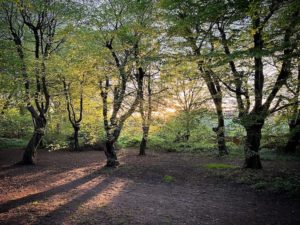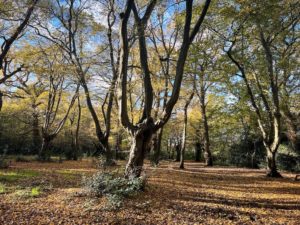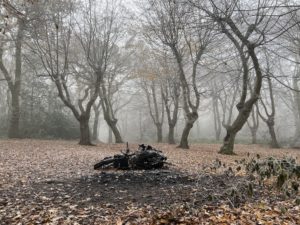Every year, we give over all of December (and usually most of January) to a series called ‘Shadows and Reflections’, in which our contributors share highs, lows and oddments from the past 12 months. Today it’s the turn of Luke Turner.

I started writing this in a cafe on the edge of Epping Forest. The snow and ice of the past week, irritatingly enduring and devilishly slippery for the London borders, had finally melted, taking the last of the year’s leaves with it. After the days of greyscale the forest glowed under a sky of paddling pool blue, bare trees a base note of brown dancing with orange, purple and grey. The café staff discussed updating the allergies warning notice as an extractor fan hummed along to 80s hits. Next to me was an empty pram. I’d just dropped my boy off for his first solo shift at nursery. He went in without a fuss. About a decade ago, when I first started thinking and writing about Epping Forest, I’d walk, head down, haring around the corner past this cafe, via the beauticians and diet clinics and fusion restaurants, and plunge under the trees in a rage, a frustration and despair, wanting this place where my family were from to somehow speak to me. A moment like that in the cafe, busy and content, would have been unimaginable.
Back then, a monumental year tended to mean that everything had gone wrong — a pal and I marked out our lives in Years of Bleak, categorised by break-ups, itinerant wanderings around the capital in desperate search of cheap beds in which to lay our sorry heads. 2022 has been a monumental year, but for once the other way. In January, my son was born, at the end of a long and fraught process in which IVF did battle with the Covid-19 crisis. He came into breathing with a face that was all wrinkles and goo, raising his arms and uttering a scream that is still unfurling, from yells to burbles, and now the start of his language. This was not the only major upheaval of the year. There was a wedding, I finished writing a book, and we moved home across London’s spiritual northern boundary, the North Circular, to suburbia and a terraced house on a cul-de-sac that, if you strain from the upstairs window, has Epping Forest within view.
I’d sometimes thought about leaving London to try the countryside, to find a place where there’d be tens or hundreds of people within walking distance, not thousands. The Covid lockdowns cured me of this. For a while it was tough, when we couldn’t even go into the local park, to see friends posting on social media of their Government Constitutionals through hills and along beaches in the warmth of that odd spring. Yet I’ve since realised that for me the countryside is essentially a form of permanent lockdown, with no galleries or gigs a 30 minute public transport ride away to bring the world to your doorstep. The cataclysm that was supposed to make us fear the contagious city was what, in early middle age, made me realise how much I loved it.

Back in my Caught by the River columns and then in my book Out Of The Woods I wrote of Epping Forest as a place that forces us to consider the city and the forest not as places of opposition but in balance, both possessing an energy that wasn’t as different as we might initially think. I wrote then from a place of deep unhappiness, self-doubt and collapse. Now in a very different mindset, I don’t feel that my relationship with forest, Nature, woodland, whatever you want to call it, has altered one bit, even if my reaction to it somehow has. I recently walked alone through an area of hornbeam pollards in Chingford at dusk, a time that used to fill me with skin-tingling dread. The night intensified as I took photos of the sculptural forms of the trees and watching munctjac deer that used to trip me out and make me think of Satan. I understood that the forest had barely changed at all, and it had not changed me. I had done that work myself, with the help of my partner who is now my wife and the mother of my boy. She was the one who made me understand that nature will not heal you, for you take your baggage into the forest, and cannot leave it behind. Now I walk there in a different way.
I have taken our boy up to the forest most weeks since he was born, in one of those baby carriers that, according to the likes of Jeremy Clarkson, emasculates the British male. I look down, and all I can see of him is his thin blond hair swirling like a hurricane photographed from space. We walk up a narrow path that, according to old maps, is older than the suburbs. Overhung by buddleia, holly and bramble, it forms a tunnel between two nondescript houses and spits us out into the woodland. Down the slope are ancient hornbeam pollards, all about the same age, suspiciously regular in their spacing, as if they were planted. We head past them (and since November a burned-out motorbike), towards the roar of the North Circular and a tunnel under it popular with weed-smokers and dealers. Skirting that piss-soaked cavern, we head through bracken and silver birch to a stand of veteran oaks. Just past them is the stone commemorating the birth of Romany preacher ‘Gypsy Smith’ and a perfect round crater made by an exploding V-2 rocket during the Second World War. I usually turn to the north, across open grassland dominated by a forked split burned tree. I have seen woodpecker, tree-creeper, trilling flocks of long-tailed tits, deer, buzzard, kite, jay, parakeet… All of this, that looks so wild, within a couple of hundred metres of a six-lane ring road and suburban back gardens. Slightly to the north, where the forest has rewilded towards Woodford High Road, it can still be a dank Victorian horror, all impenetrable holly, darkness, beech and oak increasingly choked, a silent absence of birds save the crows flitting over rusting iron fencework.

We’ve got to know this part of the forest glowing in the warmth of a spring sunset, struggling and barren in the overpowering heatwave of July, suddenly mown in October, bleached by the snow of last week. The exultation that I’ve felt there has always been in the presence of both the human and the forest together, even if that has at times included a bloodhound leaping and nipping at the toes of my son. “Don’t worry, he’s very friendly”, the owner always shouts.
I don’t think it is possible to bring and nurture new life into this world without also thinking of our mortality. I feel this is especially acute given that I am what that medical establishment terms a ‘geriatric parent’ at 44. I am aware that my dad, my boy and I are at three points on a continuum that covers over 70 years. I often see two blokes walking in the local streets. One is a man with long white hair, glasses, a sort of Steve Coogan Saxondale character. His companion has dark hair, in his late teens, and in the negotiation between stoop and upright posture that goes along with their conversation they are clearly father and son. It struck me, the third time I saw them, that their age gap was the same as between me and my boy, and that relationship, perhaps made more thoughtful by the distance in age, what I had to look forward to should I make it that far. I say that not in a pessimistic way. I say that because walking through Epping Forest, feeling the weight of this body who is a miracle to us on my shoulders and hips, hearing his annoyance when I stop to try and film a woodpecker, it is impossible not to sense the speed at which we move through human life.

As I awkwardly explain to his unknowing ears what a leaf is and how these tree machines work, I understand how we are part of this place, and ghosts through it. I am an old parent, and he is not even yet a child, but many of the hornbeam, oak and beech that surround us on our little walks together were thriving when his great-great-great grandfather was baptised in the forest a few miles to the north, and will probably outlast us both.
Tonight after a rare evening down the pub with an old pal I got off the train home on the northbound platform, walked up and over the concrete bridge, down out through the ticket barriers and onto the main road that dips towards the forest. I paused on the zebra crossing by the fried chicken shop to look east towards that broken leafless darkness scratched against the glow of a motorway and homes, A-roads and retail. It is quiet, patient, waiting for me and my boy, waiting for all of us, all of you.
*
Luke Turner is the author of ‘Out of the Woods’ — a memoir about sexuality, shame and the lure of the trees — as well as the upcoming ‘Men at War: Loving, Lusting, Fighting, Remembering 1939-1945’, published by Orion in April.